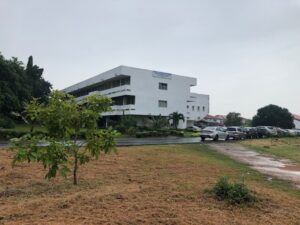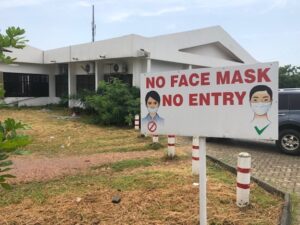
I am Amy Tran, a student in the Global Health concentration who is moving steadily towards the second year of the MPH program. My public health interests primarily revolve around issues of maternal and child health, particularly in low-resource settings, though I am also interested in aspects of data analysis, both quantitative and qualitative, and the applications of GIS in public health.
For my summer practicum experience (to which I was introduced by my former faculty advisor, Dr. Rohit Ramaswamy), I am working with a joint team of UNC Gillings researchers and the Kybele-Ghana organization. My preceptors are also Ph.D. students here at Gillings—Stephanie Bogdewic, MPH, and Caitlin Williams, MSPH. This collaboration is centered on the scale-up of the midwife-led Obstetric Triage Implementation Package (OTIP) in Ghanian hospitals and tertiary health facilities, which was developed in 2013 and since 2019, has been scaled up to a national level to be implemented in six other high-volume hospitals [1].

This obstetric triage intervention is aimed at reducing maternal mortality by addressing the third delay in referral hospital settings, or the delay in a patient receiving the appropriate health care once it has been sought [1, 2]. Midwives are central to the OTIP intervention, as they are the ones responsible for assessing mothers* once they arrive at the delivery facility with green, yellow, and red bands that indicate the risk level of the pregnancy [1]. At this stage, the research team is concerned with assessing the “know-do” gap in regards to implementation theory, as well as the leadership dynamics and development tied to the program.

I have limited “professional” experience working in global public health settings, generally relegated to a Peace Corps volunteer experience that is more aptly described as a community health outreach “stint”, that ultimately motivated me to pursue formal education and qualifications here. Therefore, being able to work with a research team on a project with clear and direct practical applications to maternal health has given me an extremely valuable opportunity to look at a public health issue and intervention from a different perspective. In addition, my responsibilities include the development of an interview guide for a series of in-depth qualitative interviews with leadership in the OTIP intervention, as well as the qualitative data analysis and presentation of findings to a specialized stakeholder audience. I’m thankful for the introduction to qualitative research methods I received from Dr. Suzanne Maman and the teaching team in HBEH 753 Qualitative Methods in Health Behavior (highly recommend!), in addition to the other synthesis/interprofessional skills introduced in other core courses. My preceptors have been nothing but supportive and accommodating—they are great motivating mentors and I look forward to the rest of this practicum experience!
As an added note, due to the hybrid/remote nature of this practicum experience, I have been able to benefit from the freedom to better explore the local sights. Recently, I have taken a trip to Asheville, including the iconic Biltmore Estate, as shown (above). As a Florida native, I am excited for this opportunity to explore a brand new place!
-Amy T.
* The author acknowledges and respects the lived experiences of birthing individuals with gender identities not exclusive to cisgender female identities. However, for the purposes of data collection/analysis and recognizing Ghanian cultural values and norms, individuals that give birth have been referred to with traditional binary terminology, including women, females, and mothers.
